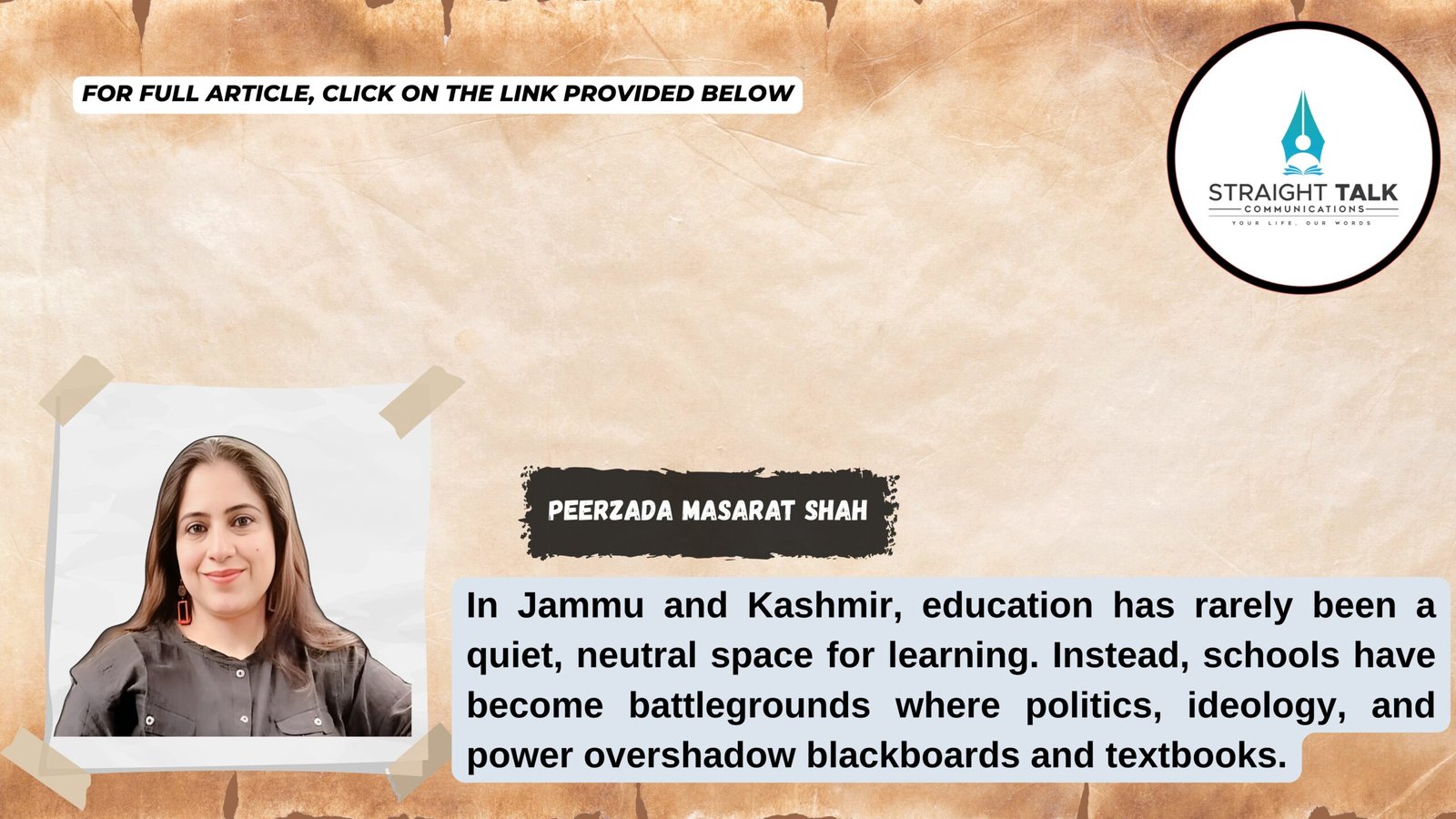From Chalkboards to Chessboards: How Kashmir’s Schools Became Political Pawns

Peerzada Masarat Shah
In Jammu and Kashmir, education has rarely been a quiet, neutral space for learning. Instead, schools have become battlegrounds where politics, ideology, and power overshadow blackboards and textbooks. The latest episode in this long-running drama is the government’s decision to take over 215 schools run by the Falah-e-Aam Trust (FAT).
On the surface, this appears to be reform: regulate the schools, bring them under state control, and ensure transparency. But beneath the veneer, the picture is messier. What is framed as “saving education” also resembles a power play—an experiment where, as always, students are the biggest losers.
“Education is the most powerful weapon which you can use to change the world.” Nelson Mandela
The Convenient Villain
FAT schools have a complex history. Founded in 1942 under the umbrella of Jamaat-e-Islami (JeI), they grew rapidly—by 2014, over 75,000 students, including 5,000 orphans, were enrolled across 300 institutions. Affordable and disciplined, these schools became a lifeline in rural areas where state-run education often faltered.
Yet, there’s another side to the story. Critics argue that alongside modern subjects, FAT schools subtly propagated an ideological worldview—one that valorized jihad, glorified separatism, and blurred the line between faith-based education and political indoctrination. Intelligence agencies have long accused these schools of serving as ideological nurseries, with some students allegedly drawn into militancy. With JeI’s links to Hizbul Mujahideen and the shadow of attacks like Pulwama in 2019, suspicion became entrenched.
In 2019, JeI was banned under the Unlawful Activities (Prevention) Act. FAT schools, though not immediately targeted, carried the stigma of their parent body. For six years, successive governments—appointed and elected—refrained from direct action. Then, abruptly, the newly elected government, armed with a public mandate, decided to act.
What was deemed unnecessary for years became urgent overnight.
Politics in the Guise of Reform
The government’s argument has some merit. If FAT schools indeed fostered ideological indoctrination, stricter oversight is justified. However, rather than establishing a regulatory body, auditing curricula, or introducing targeted reforms, the government opted for the bluntest tool—seizure of management.
This isn’t policymaking; it’s experimental theater played with children’s futures.
Sanjay Kumar of the JKNPF, a party committed to national integration, calls JeI the “root cause of J&K’s biggest challenges: drug menace, unemployment, and social evils.” He paints FAT schools as ideological traps: “From Dhaka to Islamabad, Kandahar to Egypt—this ideology has turned common men into extremists. Instead of producing fanatics, we must create doctors and engineers.”
Such rhetoric makes for powerful soundbites. But for a child in a FAT classroom, it raises an unanswered question: What happens to my education tomorrow?
“The function of education is to teach one to think intensively and to think critically. Intelligence plus character—that is the goal of true education.” Martin Luther King Jr.
Students and Teachers: Collateral Damage
Caught between accusations of radicalism and the government’s sudden zeal are thousands of students and teachers. These are children who enrolled to learn, not to inherit ideological baggage. These are educators who built careers in institutions that, despite their controversies, undeniably boosted literacy and discipline in Kashmir’s education landscape.
What happens to them now? Will classes be disrupted mid-session while bureaucrats shuffle papers? Will teachers be smoothly absorbed into government service or left to join the growing pool of unemployed graduates? The government offers little clarity beyond vague promises of “better quality education.”
For students, uncertainty is the new syllabus.
History Repeating, Badly
This isn’t the first time FAT schools have faced government scrutiny. In 1990, when Mufti Mohammad Sayeed was Union Home Minister, a ban was imposed on JeI schools, justified as a measure against subversive elements. The courts intervened, and the schools survived.
The 2019 JeI ban reignited scrutiny, yet no direct action against FAT schools followed for six years. The sudden enforcement today feels less like urgency and more like political symbolism. Once again, education takes a backseat to political theater.
Reform or Revenge?
The danger lies in normalizing intolerance dressed as reform. One may criticize Jamaat-e-Islami’s politics or FAT’s history of ideological education, but denying their role in spreading literacy, especially in underserved rural areas, is disingenuous.
If reform were the goal, the government had better options: engage stakeholders, create oversight mechanisms, build consensus, and prioritize students’ interests while phasing out problematic practices. Instead, it chose a shortcut—ban, takeover, declare victory.
The result? Another cycle of litigation, disruption, and distrust. Another chapter in Kashmir’s history where education becomes collateral damage in battles of ideology and power.
“An investment in knowledge pays the best interest.” Benjamin Franklin
The Final Bell
Education is a society’s most sacred investment in its future. Yet, in Jammu and Kashmir, it is too often treated as a political pawn—moved, sacrificed, or discarded to score points on the chessboard of power.
If FAT schools are to be reformed, let it be done with transparency, accountability, and genuine concern for students. Not with press conferences and chest-thumping. If they are to be criticized for their past, let the critique be honest—but let the remedy be equally honest.
Here is the truth no political party will admit: Kashmir’s children don’t need ideological liberation; they need uninterrupted, quality education. They don’t need politicians dictating the syllabus of their futures. They need teachers, classrooms, and stability.
Until that lesson is learned, Kashmir’s education system will remain what it has always been—chalkboards sacrificed on the altar of politics.







